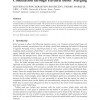Free Online Productivity Tools
i2Speak
i2Symbol
i2OCR
iTex2Img
iWeb2Print
iWeb2Shot
i2Type
iPdf2Split
iPdf2Merge
i2Bopomofo
i2Arabic
i2Style
i2Image
i2PDF
iLatex2Rtf
Sci2ools
102
click to vote
LOGCOM
2007
2007
Conciliation through Iterated Belief Merging
Two families of conciliation processes for intelligent agents based on an iterated merge-then-revise change function for belief profiles are introduced and studied. The processes from the first family are sceptical in the sense that at any revision step, each agent considers that her current beliefs are more important than the current beliefs of the group, while the processes from the other family are credulous. Some key features of such conciliation processes are pointed out for several merging operators; especially, the stationarity issue, the existence of consensus and the properties of the induced iterated merging operators are investigated.
| Added | 16 Dec 2010 |
| Updated | 16 Dec 2010 |
| Type | Journal |
| Year | 2007 |
| Where | LOGCOM |
| Authors | Olivier Gauwin, Sébastien Konieczny, Pierre Marquis |
Comments (0)

